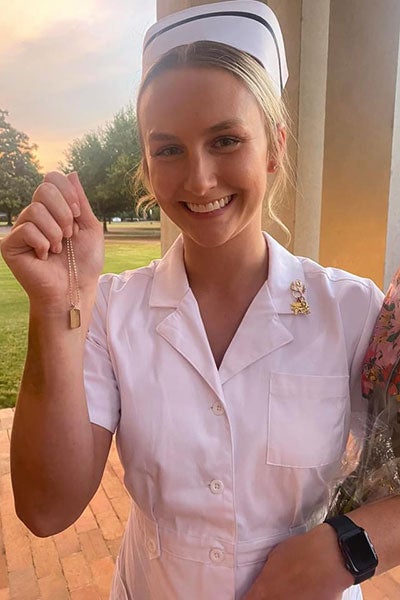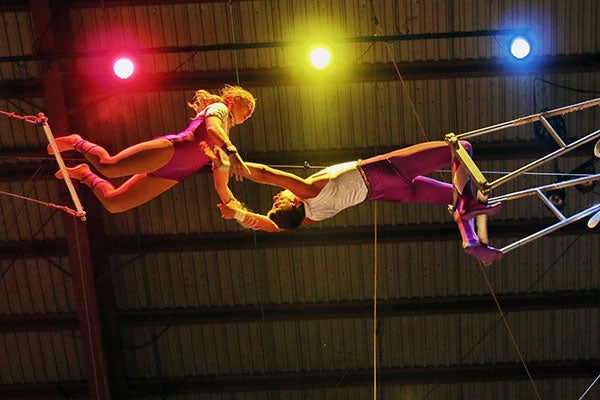RIBN program helps former circus performer transition to new life as nurse
At the end of a particularly challenging shift sometimes nurses will say their day was a circus.

Madelyn See, a recent graduate of Wayne Community College’s nursing program, will join the College of Nursing as a Regionally Increasing Baccalaureate Nurses (RIBN) program student. (Contributed photo)
One recent graduate of Wayne Community College’s associate degree in nursing program, who has been accepted into East Carolina University’s Regionally Increasing Baccalaureate Nurses (RIBN) program, might be the best person in the history of Pirate nursing to make that determination.
Madelyn See is from Denver, Indiana, a small town in the north central part of the state.
“There are no stoplights. There is a grocery store that is family owned and maybe 200 people, so very small,” See said.
One town over is Peru, another small community of about 10,000, hemmed in during the summer by row after row of corn and soy. Not much happens in Denver, or Peru, See said, besides the circus.
Yes, the circus.
“A long time ago, the circus stopped in town and just decided that that’s where the headquarters was going to be,” See said. “And they made an amateur circus. So, in that town, it’s completely normal for people to say, ‘Yeah, I’m in the circus.’”
Some of the most famous shows in American circus history called Peru home over the years: the Ringling Brothers, the Hagenbeck-Wallace Circus and even Buffalo Bill’s Wild West show. The International Circus Hall of Fame is located there, too.
See’s mother enrolled her in a gymnastics program as a young girl, which was a natural transition to joining the Peru Amateur Circus at age 7, where she performed until she graduated high school.
In most communities, kids form baseball and soccer teams. See and her peers walked on high wires with other performers standing on their shoulders, bounced on trampolines and practiced the teeterboard — a long plank hinged in the middle that can rocket a performer into the air for feats of explosive aerial gymnastics.
The trapeze is where See excelled, though.
“I went up there for the first time when I was 11 and my heart racing. I was like, ‘I’m just going to climb back down the ladder,’” See remembers. “But I just kept trying. I didn’t make it for three years, and the first year that I did make it I was just ecstatic.”

Madelyn See performs on the trapeze at the Peru Amateur Circus in Peru, Indiana
Flying trapeze artists, who work dozens of feet above the ground, require strength, precision and a life-and-death level of self-reliance — which happen to be critical traits and skills necessary for modern health care work.
See’s fiancé is an Air Force staff sergeant at Seymour Johnson Air Force Base near Goldsboro, which brough her to North Carolina. She wanted to complete all her undergraduate nursing education and training at ECU, but she had to figure out a way to pay for it, not able to qualify for in-state tuition.
ECU’s Regionally Increasing Baccalaureate Nurses (RIBN) program is a cost-effective way for registered nurses to transition to a four-year baccalaureate education.
Dr. Kelly A. Cleaton, the RIBN program coordinator, said that See is a model of the kind of nurses that she endeavors to accept into the program to become future ECU nurses.
“Madelyn is a wonderful example of what our RIBN collaborative gives to our local communities and to the nursing profession,” Cleaton said.
Nursing school has been challenging, See said, but having a significant other in the military has been an added hurdle to overcome. He’s been deployed several times during her schooling, but she has found ways to be resilient.
“When I’m tired or I don’t want to cook or I don’t want to fold my laundry, he’s there to be the other 40% that I can’t pick up for myself,” See said. “And on deployment, there’s nobody else to do that for you, but it goes by really fast once you get into a routine.”
During her first clinical rotations she was apprehensive about making a career out of health care, until the day that two flight nurses stopped by the hospital where she was working.
“One of our clinical instructors said, ‘If anybody in this room was ever going to be a flight nurse, it would be you, Madelyn,’” and after some research See was sold on the idea. “That’s absolutely something I would love.”
Even before graduating from Wayne Community College, See had a job in the emergency department at UNC Health Wayne, which is fortuitous. Flight nurse programs require several years of critical care experience, which will give See time to also complete her Bachelor of Science in nursing at ECU before tackling the training to fly in air ambulances.
Whether it’s in the air, or on the ground, See said the parallels between performing in the circus and being a nurse are obvious: teamwork, confidence and hard work.
“You have to trust the person who’s going to catch you on the other side, and if you don’t it’s not going to end well for either one of you,” See said. “But you have to make sure that you are putting in the work that’s going to get you to the point of success.”